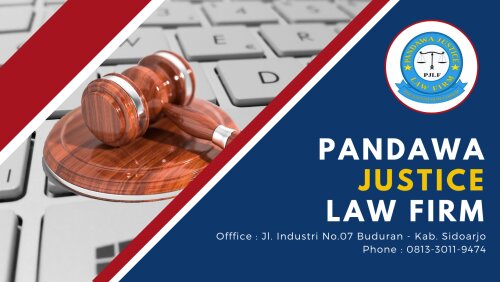Best Assault & Battery Lawyers in Indonesia
Share your needs with us, get contacted by law firms.
Free. Takes 2 min.
Or refine your search by selecting a city:
List of the best lawyers in Indonesia
About Assault & Battery Law in Indonesia
In Indonesia, Assault & Battery are criminal offenses that generally involve causing physical harm, threats, or attempts to cause harm to another individual. The Indonesian Penal Code (Kitab Undang-Undang Hukum Pidana or KUHP) penalizes both assault and battery, which may be prosecuted as either misdemeanors or felonies depending on the severity of the act, the intent, and the extent of harm caused to the victim. These offenses are taken seriously by law enforcement, and convictions can result in fines, imprisonment, or both.
Why You May Need a Lawyer
Legal assistance may be essential in various scenarios involving assault and battery. For instance, if you have been accused of committing either offense, a lawyer can help present your defense or negotiate a plea deal. Likewise, if you are a victim seeking justice and compensation, a legal professional can guide you through filing charges and representing your interests. Additionally, if the assault or battery occurs in a context such as domestic violence or in a workplace, professional legal advice can help navigate the complexities of these specific situations.
Local Laws Overview
Assault and battery in Indonesia are governed by several key provisions in the Penal Code. Primarily, Article 351 covers the physical abuse that can be classified as ordinary assault if the injuries are minor or serious assault if the injuries are severe. Furthermore, Article 352 deals with minor physical abuses and Article 356 with acts of violence causing death. Penalties can range from fines to imprisonment, with the severity of the punishment typically matching the severity of the crime. Self-defense may be an admissible defense against assault charges, but this requires clear evidence showing the necessity of the act to prevent harm.
Frequently Asked Questions
What constitutes assault and battery under Indonesian law?
Under Indonesian law, assault is generally recognized as an attempt or threat of violence, while battery involves actual physical violence against another person.
What penalties can be imposed for assault and battery in Indonesia?
Penalties can range from fines to imprisonment, depending on the severity of the assault or battery and the surrounding circumstances, such as the victim's injuries.
Are self-defense claims recognized in Indonesian assault cases?
Yes, self-defense can be a valid legal defense in assault cases, but it must be clearly demonstrated that the action was necessary to prevent harm.
What should I do if I’m accused of assault or battery?
If accused, you should seek immediate legal advice to understand your rights and develop a strategy for responding to charges.
Can I press charges if I’m a victim of assault?
Yes, victims can and should report the incident to the police who will investigate and potentially bring charges against the perpetrator.
What is the difference between misdemeanor and felony assault charges?
Misdemeanor charges involve less severe incidents with minor injuries, while felony charges involve more serious incidents leading to significant or lasting harm.
How does the law treat domestic assaults differently?
Domestic assaults may carry additional legal implications and resources, and often involve protective orders and specialized legal proceedings.
Are there any cultural considerations in Indonesia related to assault cases?
Yes, particularly in rural or traditional settings, cultural norms and community standing can impact both the perception of and response to assault cases.
Can children be charged with assault and battery?
Juveniles can be charged but are typically subject to a different legal process focused on rehabilitation rather than punishment.
What legal aid options are available to individuals who cannot afford an attorney?
Indonesian Bar Associations and certain non-profit organizations provide legal help to those who cannot afford private counsel, usually based on financial need assessments.
Additional Resources
If you are dealing with an assault or battery matter in Indonesia, consider reaching out to the following resources for support and information:
- Indonesian National Police (Polisi Republik Indonesia) - for reporting incidents and initiating investigations
- Indonesian Legal Aid Foundation (Yayasan Lembaga Bantuan Hukum Indonesia) - for free legal assistance and counseling
- Ministry of Law and Human Rights of the Republic of Indonesia - for official legal regulations and updates
- Komnas HAM (National Commission on Human Rights) - especially for cases involving human rights violations
- P2TP2A (Integrated Service Center for the Empowerment of Women and Children) - for support in cases involving domestic violence
Next Steps
If you require legal assistance for assault and battery in Indonesia, start by consulting with a qualified legal professional. Schedule a consultation to discuss your case specifics and evaluate the available legal options. It’s vital to understand your rights and obligations, so consider obtaining legal counsel that specializes in criminal law. For those who cannot afford a lawyer, explore legal aid services to ensure you have adequate representation.
Lawzana helps you find the best lawyers and law firms in Indonesia through a curated and pre-screened list of qualified legal professionals. Our platform offers rankings and detailed profiles of attorneys and law firms, allowing you to compare based on practice areas, including Assault & Battery, experience, and client feedback.
Each profile includes a description of the firm's areas of practice, client reviews, team members and partners, year of establishment, spoken languages, office locations, contact information, social media presence, and any published articles or resources. Most firms on our platform speak English and are experienced in both local and international legal matters.
Get a quote from top-rated law firms in Indonesia — quickly, securely, and without unnecessary hassle.
Disclaimer:
The information provided on this page is for general informational purposes only and does not constitute legal advice. While we strive to ensure the accuracy and relevance of the content, legal information may change over time, and interpretations of the law can vary. You should always consult with a qualified legal professional for advice specific to your situation.
We disclaim all liability for actions taken or not taken based on the content of this page. If you believe any information is incorrect or outdated, please contact us, and we will review and update it where appropriate.
Browse assault & battery law firms by city in Indonesia
Refine your search by selecting a city.
















